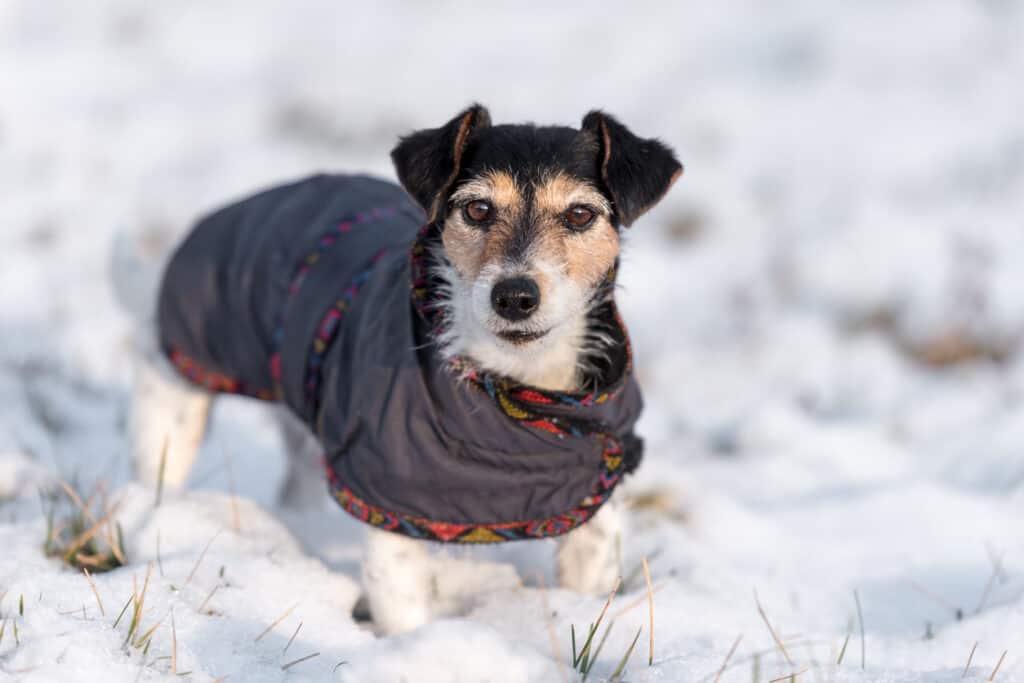With all their fur, you may think a Jack Russell Terrier wouldn’t often feel the cold, but this is not the case. Surprisingly a terrier’s normal body temperature is higher than ours and ranges from 100 to 101.5 degrees Fahrenheit (37.7 degrees Celsius to 38.6 degrees Celsius). This means that they can feel cold when there are smaller changes in temperature than we do and notice these changes often before we do.
Jack Russell Terriers definitely feel the cold and it is important that you take steps to minimise their exposure to extremely cold temperatures. Unlike dogs such as the huskie who were bred for cold conditions, the Jack Russell Terrier fails to generate significant body heat to protect them from cold conditions.
Jack Russell Terriers are small dogs and small anything has a hard time keeping warm because they lose body heat faster. This is mostly to do with their thin haired coats which offer little to no protection against the cold elements.
As a general rule Jack Russell Terriers can handle cold temperatures for around 20 minutes to 60 minutes when they are playing and running around. During these times, their body warms up and supports heat production.
It is also important to keep in mind that if your terrier is young, energetic, healthy, and well-built, then they will be able to handle cold weather more than a very young, very old or very unwell Jack Russell Terrier.
Does the type of coat make a difference?
The thin coats of the smooth haired Jack Russell Terrier offer little protection in cold weather and terriers with these coats lose body heat fast and become cold quickly.
Jack Russell Terriers who possess a broken or rough hair coat fair significantly better in the wintertime due to the added length and thickness of hair. However, despite this added protection, this does not exempt them from the negatives of harsh temperature, and they will still struggle in harsh winter temperatures.
It is important to be aware that both types of coats lack enough insulation to handle cold weather and it is essential to take the necessary measures to help your terrier handle the cold.
What temperature is too cold for a Jack Russell Terrier?
While the exact temperature that is too cold Jack Russell Terrier get cold varies, you should not keep them outside for an extended period of time if the temperature drops to 45 degrees Fahrenheit (7 degrees Celsius) and below. This temperature is potentially unsafe, especially for smooth haired terriers.
Once the temperature drops below 30 degrees Fahrenheit (-1 degrees Celsius) the risk of outdoor exposure is potentially life threatening and prolonged exposure to this temperature should be avoided for all Jack Russell Terriers.
These temperatures are only guide and if your Jack Russell Terrier is younger than 12 months old or considered senior (over 8 years old) steps should be taken to keep them warmbefore the temperature drops below 45 degrees Fahrenheit (7 degrees Celsius). Terriers in these age brackets are more susceptible to the effects of weather extremes.
It is also important to consider the wind chill factor and other weather conditions like rain, sleet, or snow that can make the great outdoors even more chilly for terriers.
How to identify if your Jack Russell Terrier is cold?
Since Jack Russell Terriers cannot tell us when they are cold, it is important to watch for tell-tale signs that they may be feeling uncomfortable. When your terrier is cold, they will show you these signs to let you know they need to be warmed up.
1. Shivering
One of the most obvious indications that your Jack Russell Terrier is not comfortable with the temperature is shivering.
When the temperature drops shivering is an involuntary response designed to get the blood pumping to raise body temperature and prevent hypothermia.
Smaller dogs, like Jack Russell Terriers are more prone to shivering due to their lack of body mass and insulation. Smooth coat Jack Russell Terriers tend to shiver more easily than broken and long-haired terriers.
2. Vocalizations
If your Jack Russell Terrier suddenly begins ‘talking’ to you while making eye contact and behaving abnormal without any clear reason, they may be trying to communicate with you they are uncomfortable.
A terrier who is cold may look agitated or anxious while whining and/or barking.
3. Decreased activity – slow movements
When Jack Russell Terrier’s are too cold, their energetic nature disappears, and they may not move around much. Cold temperatures tend to make their muscles contract, causing tightness and difficulty moving freely.
If your terrier begins showing definite signs of slowing down, a decrease in activity, or even stops moving, this can be a sign they are cold.
While this can be confused with just fatigue from exercise, it can also be a sign of something more serious, so it is important to get them warm inside if you’re in cold temperatures.
4. Holding up a paw
If you notice your Jack Russell Terrier suddenly lifting their paws up, shaking their paws as if something was stuck in it or even whining while trying to keep their paws up, they may have balls of snow or ice between the pads of their feet
This means that the ground is too cold for your terrier’s paws, and you either need to get them back inside immediately, or you need to get something on their paws to protect them.
5. Hunching over or curling up in a ball
When Jack Russell Terriers are cold, they attempt to warm themselves up with their body heat by curling up in a ball.
If you notice your terrier curling up into a ball when outside or hunched over with their tail tucked between their legs, they are most likely cold.
Tips to keep your Jack Russell Terrier warm
Since staying outside during cold weather can be potentially harmful for your Jack Russell Terrier, here are some tips to help them stay warm during the harsh winter months.
1. Put warm clothes on your Jack Russell Terrier
An appropriate winter coat will help protect your Jack Russell Terrier from cold temperatures, wind, and ice.
It is a good idea to put a winter coat on your Jack Russell Terrier when temperatures drop below 45 degrees Fahrenheit (7 degrees Celsius) or when they start to show signs of discomfort in cold weather.
This is especially important for senior Jack Russell Terriers (over 8 years old), puppies (younger than 12 months old) or unwell terriers because they can’t handle cold weather as well as fit, healthy adult terriers.
Look for a coat that fits snugly but doesn’t restrict your terrier’s movements. Make sure the coat you choose covers their neck and belly and is easy to get on and off. An insulated material, like fleece, would offer the best protection in subzero temperatures or biting winds and a water-repellent material is a good idea for wet or mild climates.
Another way to help your Jack Russell Terrier in freezing conditions is to use some protection on their paws. Paw protection can be as simple as putting on paw wax or balm to act as a barrier to snow and moisture or getting booties to keep your dog’s paws dry and protected from the elements.
2. Less time outdoors
Even though Jack Russell Terriers are energetic dogs, who enjoy time outside, in below freezing conditions it is important to limit their outdoor time to around 15 to 20 minutes. This is enough time for them to potty and have a quick play.
For exercise, like walks or running, it is important to consider that if you are rugged up then they would probably need extra protection, like a winter coat as well.
Since snow and ice can be trapped within their paws ensure you carefully clean and wipe them when coming back from outdoors.
3. Warm bedding
Adding extra warm, soft bedding for your Jack Russell Terrier to sleep with, such as blankets and cushions, or even a heated microwavable heat pillow will help them stay warm.
4. Insulated shelter
Keeping your Jack Russell Terrier inside over the winter period is definitely ideal, however, this is not always possible due to various reasons.
An insulated shelter, like a kennel or enclosed area of your pooch, will provide a warm place for your terrier to escape the elements. Ensure your terrier has a winter coat on as well if they spend nights in their kennel.
Elevating their bed off the cold floor will also help in keeping them warm and prevent moisture from seeping into their blankets.
Sources:
Do Jack Russells Get Cold? [And How To Keep Them Warm] (jackrussellterrierdog.com)




![How Much Exercise Does A Jack Russell Terrier Need? [Complete guide for all life stages]](https://jackrussellsunleashed.com/wp-content/uploads/2022/03/iStock-1143749718-1024x683.jpg)
![My Jack Russell Terrier Hates Baths! [4 reasons why & 5 helpful bath time tips]](https://jackrussellsunleashed.com/wp-content/uploads/2022/03/iStock-613556174-1024x683.jpg)